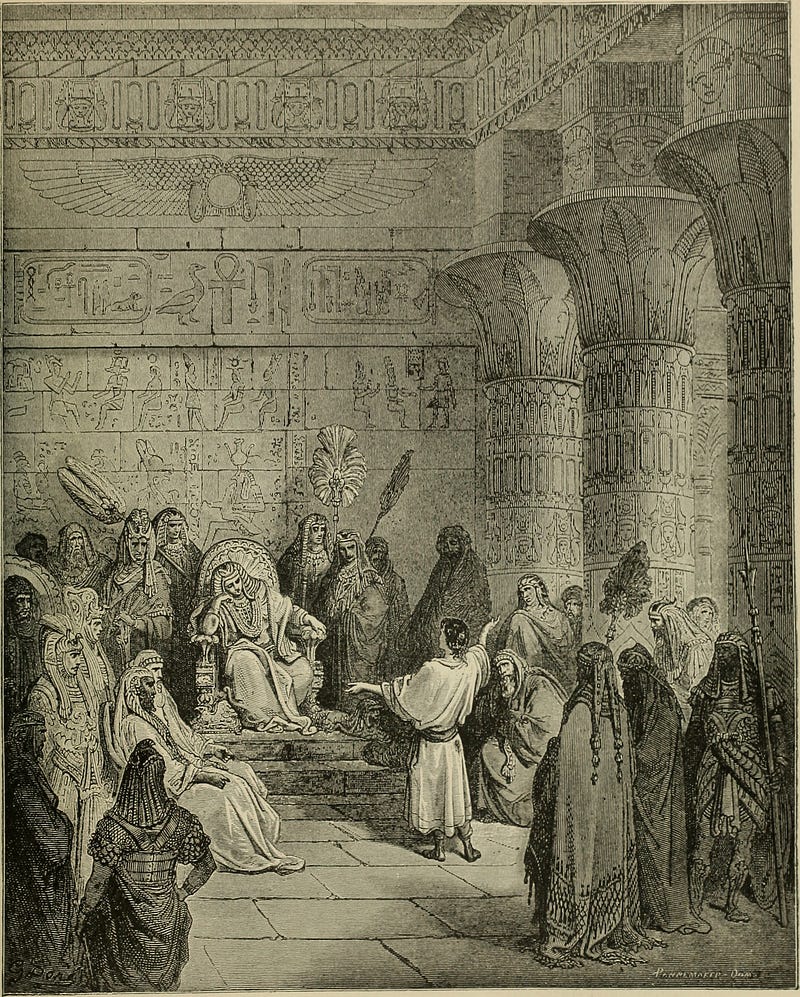Bible Study Guide Day 026: Genesis 41–42
On the third day, Joseph said to them, “Do this and you will live, for I fear God”
Genesis 42:18

Previous Day 025: Genesis 38–40
Genesis 41
Pharaoh’s Dreams
In Genesis 41, two years have passed since Joseph accurately interpreted the dreams of Pharaoh’s cupbearer and baker. Now, Pharaoh has had two troubling dreams and is seeking someone who can interpret them for him. The cupbearer finally remembers Joseph and tells Pharaoh about his ability to interpret dreams.
Pharaoh summons Joseph from prison and asks him to interpret his dreams. Joseph, fully aware that it is God who gives interpretations of dreams, humbly tells Pharaoh that he cannot interpret the dreams but God can.
Pharaoh then proceeds to tell Joseph his dreams — seven plump cows being devoured by seven thin cows and seven healthy heads of grain being swallowed up by seven withered heads. Joseph immediately knows that the two dreams carry the same meaning, and it is a warning from God about seven years of abundance followed by seven years of famine.
Not only does Joseph interpret Pharaoh’s dreams, but he also presents a plan to save Egypt during the upcoming famine. This demonstrates Joseph’s wisdom and how God has been preparing him for this moment.
Joseph recommends that Pharaoh appoint a wise and discerning man to oversee the collection and distribution of food during the years of abundance. Impressed with Joseph’s wisdom, Pharaoh appoints him as second-in-command over all of Egypt.
Joseph in Charge of Egypt
Joseph, now 30 years old, is put in charge of the entire land of Egypt. He is given a new name — Zaphenath-Paneah, meaning “God speaks and he lives”. Pharaoh also gives him a wife named Asenath, daughter of Potiphera, priest of On.
During the seven years of abundance, Joseph collects and stores food, preparing for the upcoming famine. He stores up huge amounts of grain, so much that it becomes impossible to keep track of the amount.
In these years, Asenath gives birth to two sons — Manasseh and Ephraim.
After the seven years of abundance come to an end, the famine begins, just as Joseph had predicted. Joseph opens all the storehouses and sells grain to the Egyptians. The famine is so severe that all of the surrounding countries come to Egypt to buy food from Joseph.

Genesis 42
Joseph’s Brothers Go to Egypt
As the famine spreads, Jacob and his sons are also affected. Hearing that there is food in Egypt, Jacob sends ten of his sons to buy grain from Joseph. Benjamin, however, stays behind as Jacob fears for his safety.
When Joseph’s brothers arrive in Egypt, they bow down before him, fulfilling the dreams he had shared with them many years ago. However, they do not recognize him. Joseph, on the other hand, recognizes his brothers and remembers their betrayal.
He accuses them of being spies and puts them in prison for three days. On the third day, he offers to release all but one brother if they bring Benjamin to Egypt.
The brothers are overcome with guilt and fear as they reflect on their past actions towards Joseph. They believe that this is God’s punishment for their sins.
Simeon is held as collateral while Joseph gives orders to fill their sacks with grain and return their money.
As the brothers return home, they find the money they had used to purchase grain had been returned in their bags. This further adds to their fear and confusion.
When they arrive back in Canaan, they tell Jacob all that had happened and how the governor of Egypt had accused them of being spies.
The chapter finishes with Jacob refusing to send Benjamin, out of fear of losing both him and Simeon. This sets the stage for the next chapter as Joseph’s plan to test his brothers’ character unfolds.
